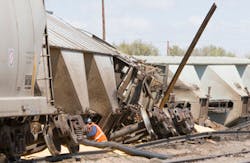North Dakota train accident will not affect rail movements of crude, analysts say
The derailment of a crude-carrying train in North Dakota in late December was not the first accident over the past year to raise questions over the safety of oil transportation by rail. While the North Dakota incident might lead to increased regulatory scrutiny, experts believe that it will not significantly affect the use of rail as a means of transporting oil.
According to an industry analysis by investment banking firm Tudor, Pickering, Holt & Co., there is a long-term trend toward moving crude by rail and the occasional incidents are not likely to deter oil companies. Carrying fuel from the Bakken shale in North Dakota to the east and west coasts of the United States will remain mostly reliant on rail because of the lack of pipeline infrastructure leading to refineries there, the analysis said. Still, the firm expects changes in regulation as far as permitting processes are concerned.
RELATED: American Chemistry Council calls for 'comprehensive approach' to safety for rail transport
It is generally considered that pipelines are a much safer way to transport oil but there is a restricted number of lines and building new ones takes years and involves regulatory hurdles. That is why over the past few years rail has emerged as the most widely used means of transportation. According to statistics from the Association of American Railroads, in 2012 an average of 425,000 barrels of oil were moved by rail each day, compared to 18,000 in 2008. In 2013 the upward trend continued, with an estimated increase of 31 percent on the previous year, Fuel Fix reported.
